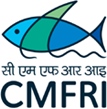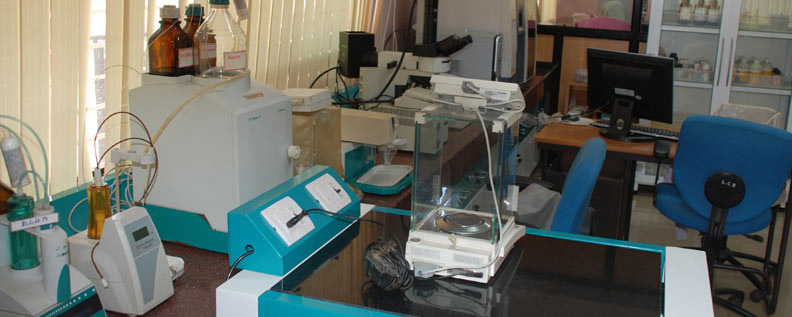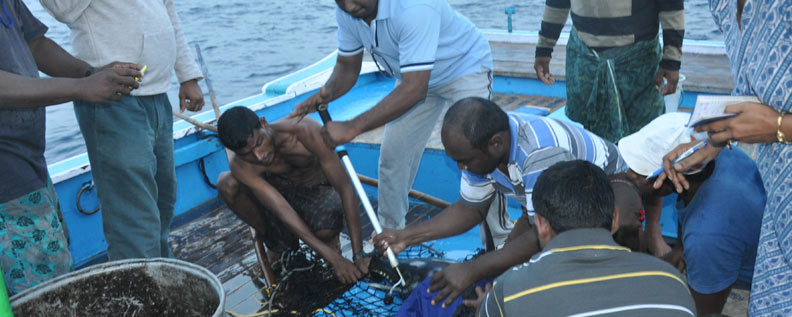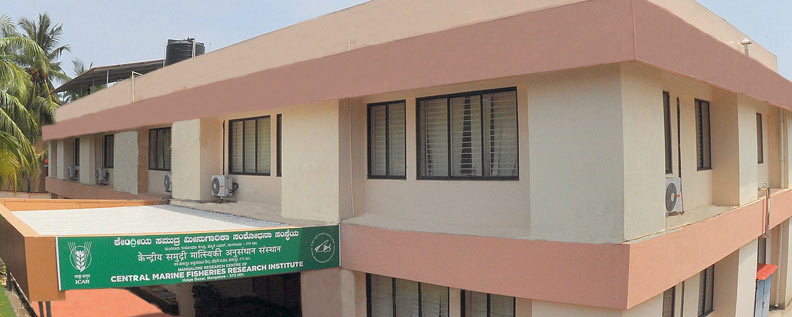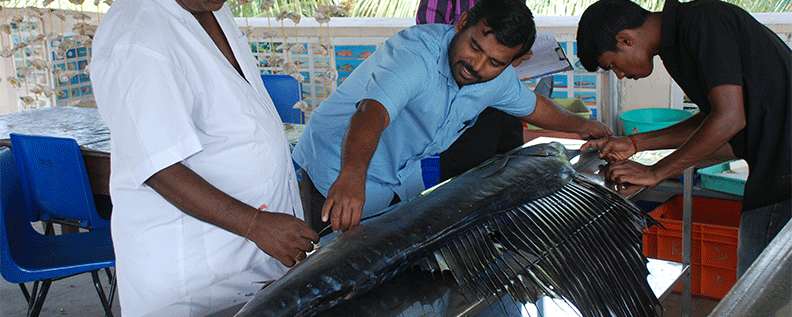Home Mangalore Regional Centre
Thrust Areas of Research:
Stock assessment of exploited marine fishes of Karnataka and Goa
Propagation of small mariculture technologies suitable for adoption in coastal Karnataka
Monitoring health of coastal ecosystems
Socio-economics of marine fishers of Karnataka
Develop advisories for management of marine fisheries of Karnataka and Goa
Ongoing Research Projects:
a. In-house projects :
| Development of fishery management plans for sustaining marine fisheries of Karnataka and Goa. |
| GIS based resources mapping of distribution and abundance of finfishes and shellfishes off Indian Coast for suggesting operational based strategies for fisheries management |
| Development of fishery management plans for bivalve fisheries of India |
| Development of strategies to sustain stock and fishery of large pelagics of the Indian Coast |
| Remote sensing assisted bio dynamic forecasting paradigm for Indian Marine Fishery Resources |
| Innovations in Sea Cage Farming and Coastal Mariculture |
| Ecosystem process of critical habitat and development of protocols for restoration |
| Pollution and litter monitoring in the coastal and marine ecosystem and their impact. |
| Economics of Marine Fisheries and Sustainable Management :Policy Issues and Interventions |
| Capacity Development for Ecosystem Based Responsible Fisheries Management In India- A Co-learning Action Research |
| Assessment of Elasmobranch Resources in the Indian seas |
| Sustainable Molluscan Mariculture Practices |
b. Ongoing- Funded Projects:
| Satellite Telemetry studies on Migration patterns of Tunas in Indian Seas” (SATTUNA) |
| Flow of Matter through tropic levels and biogeochemical cycles in Marine and Estuarine ecosystems, under the National Programme “Sustained Indian Ocean Biogeochemical, Ecological Research and Geotraces”. (SIBER) |
| National Initiative on Climate Resilient Agriculture. (NICRA). |
| Global learning for local solutions: Reducing vulnerability of marine-dependent coastal communities |
Completed Research Projects (last plan period):
a. In-house projects :
| Management advisories for sustaining marine fisheries of Karnataka and Goa.(PEL/IDP/02. |
| Decision support system for marine fisheries management, FRAD, 2007-2008 |
| Development of diversified grow-out mariculture systems, MFD 2007-08 |
| Resource damage assessment in marine fisheries impact of selective fishing of juveniles, bycatch and discards in trawl fisheries (CFD/IDP/02). |
| Assessment of biodiversity and ecological impact in open sea cage farming(MBD/RE/03) |
| Innovations in sea cage farming and development of sustainable capture based aquaculture (CBA) |
| Recruitment dynamics of penaeid prawns along the Indian coast |
| A diagnostic study on Dimensions, Causes and Strategies of Poverty and Marginalisation among Marine Fisherfolk |
| Understanding threatened coral reef ecosystem of southern India and designing interventions aimed at their restoration. |
| Studies on the specific and intraspecific diversity of Lutjanids of the Indian seas |
| Impact of anthropogenic activities on coastal marine environment and fisheries |
| Impact and yield study of environmental changes on distribution shifts in small pelagics |
| Development of fisheries ecosystem restoration plans for critical marine habitats |
| Coastal rural Indebtedness and Impact of Microfinance Coastal Rural Indebtedness and Impact of Microfinance in Marine Fisheries Sector |
| Technological upgradation in molluscan mariculture |
b. Completed–Funded Projects:
| Impact, adaptation and vulnerability of Indian marine fisheries to climate change – Phase II - |
| Validation of PFZ advisories brought out by INCOIS among artisanal and small mechanized sector fishermen along Kerala coast to compare the advantages derived for different types of fishing operations / targeted species - |
| Studies on marine mammals of Indian EEZ and the contiguous seas - |
c. Consultancy Projects:
| Utilization strategy for oceanic squids (Cephalopoda) in Arabian Sea: A value chain approach |
| Monitoring studies on the hydrobiological conditions of coastal sea off Mangalore SEZ |
| Sustainable coastal protection and management. |
Significant Achievements in the last 5 years
Technologies/Concepts/Findings
Capture Fisheries
- Prediction and modelling of marine fishery yields from Arabian Sea off Karnataka using ECOSIM
- Strengthened the scientific database -catch and effort of the exploited fish stocks and their distribution, abundance, biological characteristics, mortality rates, yield per recruit, status of exploitation, sustainable yield and techno-economics of fishing operations.
- The effect of bottom trawling on the benthic fauna off Mangalore coast was studied and reported
- Log sheets in local languages prepared and distributed to sampled commercial fishing crafts to collect in-situ data on fishing operations, catch and effort.
- Participatory GIS program (PGIS) in marine fisheries for spatio-temporal resource mapping to avoid resource damage, identify seasonal juvenile abundance and evolve management strategies for conservation and sustainable harvesting
- Innovative GIS based methodology developed for resource mapping of marine fishes to reduce CO2 emission from Trawlers.
- Purse-seining with light popularized through fishing demonstrations off Karnataka coast
- Advisories cautioning the impact of this destructive fishing method were provided to the State administration
- Limit reference points (LRP),YMSY & fMSY and target reference point (TRP), f0.1, were set for cephalopod resources (Karnataka) to guide rational fisheries management decision.
- Inter-cohort growth pattern of cuttlefish, Sepia pharaonis population (Clade C), distributed along the Eastern Arabian Sea (South-West coast of India) modelled.
- Protocols for age estimation in Indian squid Uroteuthis (Photololigo) duvauceli using hard-parts standardised.
- Protocol for tagging large sized yellowfin tunas with pop-up satellite tags was standardized.
- Bivalve harvesting areas classified developed for the DK District of Karnataka based on the US NSSP and EU Guidelines
Mariculture
- Technology of green mussel using Participatory Action Model, (PAM) developed for the fishermen of Saligramma, Karnataka
- Integrated farming of mussels and shrimps for additional income generation involving the participation of shrimp farmers from Saligrama developed
- Mud -crab fattening technique introduced and popularised in Karnataka
- Technology for the offshore cage culture of finfishes and crustaceans in a participatory research program with the association of traditional fishermen of Karnataka was developed and demonstrated
- Capture based aquaculture Technology for Karnataka in participatory research program mode with traditional fishermen of the State of Karnataka state was evolved and demonstrated.
- Concept for Spatial marine planning for success of Mariculture was developed
- Suspended bivalve farming techniques refined and location specific protocols for farming of mussels using rack, raft and longline in estuarine and coastal waters of Karnataka developed
Social Science
- Participatory Poverty Assessment (PPA) using Participatory Poverty Assessment Registers (PPAR) used for assessment of poverty of fisher folk across all sectors of marine fisheries.
- Multidimensional Poverty Index (MPI) was developed for the Marine Fisheries Sector of Karnataka.
- Vulnerability index (V.I) developed to measure the vulnerability of coastal districts of Karnataka to climate change.
- Farmer Sustainability Index (FSI) developed to measure the adoption of sustainable practices in capture based aquaculture.
Fishery Enviornment
- Seasonal and interannual variations of oceanographic conditions off Mangalore coast (Karnataka, India) and their influences on the pelagic fishery.
- Physiological biomarker response in bivalves integrated with environmental variability and a tool for site selection in bivalve farming developed.
- Levels of trace metals, Cd, Pb, Cu, Zn, Ni and Fe in seawater and their bioaccumulation in green mussel Perna viridis were monitored.
- Lysosomal membrane stability of haeomcytes in Perna viridis was standardized as a biomarker of environmental quality of bivalve beds of Karnataka.
- Sampling protocol for insitu collection of fishery and environmental parameters developed for validating chlorophyll and fish production.
- Water quality: of estuarine and coastal areas monitored seasonally and annually.
- Trace metals (arsenic and mercury) in Mackerel, Oil sardine, squid, crab and prawn was found to be within the safe limit of WHO.
- A study of the coastal beaches of Karnataka and Goa was carried out to assess the impact of marine litter.
Biodiversity
- Database for underwater visual census of coral fishes developed for the first time in Karnataka.
- Fauna and flora of marine, estuarine and islands off Karnataka estimated.
- Coastal birds and seabirds (41 species) occurring along the Karnataka were identified and photographed.
- Stranding’s, sightings and incidental catch of marine mammals, seaturtles recorded from and off the coast of Karnataka.
- The centre generated 79.28 lakhs of rupees through 14 consultancy projects (2004-2009)
- Home
- COVID-19 Advisories
- Director's Message
- Centre of Excellence (Dr.EGS - CoEI)
- CMFRI in Media
- MFIS
- Latest Research Findings
- Fish Catch Estimates
- Infographics
- Fished Taxa Listing
- CMFRI Nutraceuticals
- Training Courses
- Job Opportunities
- Tenders
- Patents
- Awards
- Fish Seed for Sale
- Museum
- KVK / Services / Swachh Bharat
- Staff
- Consultancy
- CMFRI Theme Song
- Downloads
- Official Language
- Right to Information
- Public Interest Disclosure & Protection of Informers (PIDPI)
- Links
EVENT CALENDAR
December 2021

29
30
1
2
3
4
5
6
7
8
9
10
11
12
13
14
15
16
17
18
19
20
21
22
23
24
25
26
27
28
29
30
31
1
2
